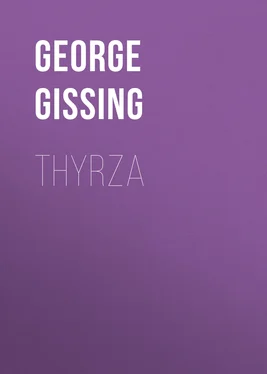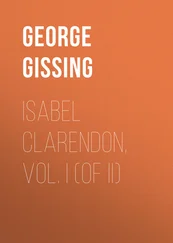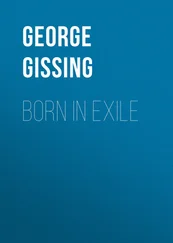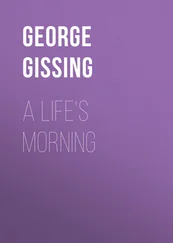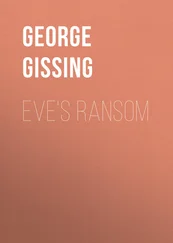George Gissing - Thyrza
Здесь есть возможность читать онлайн «George Gissing - Thyrza» — ознакомительный отрывок электронной книги совершенно бесплатно, а после прочтения отрывка купить полную версию. В некоторых случаях можно слушать аудио, скачать через торрент в формате fb2 и присутствует краткое содержание. Жанр: foreign_prose, literature_19, foreign_antique, на английском языке. Описание произведения, (предисловие) а так же отзывы посетителей доступны на портале библиотеки ЛибКат.
- Название:Thyrza
- Автор:
- Жанр:
- Год:неизвестен
- ISBN:нет данных
- Рейтинг книги:3 / 5. Голосов: 1
-
Избранное:Добавить в избранное
- Отзывы:
-
Ваша оценка:
- 60
- 1
- 2
- 3
- 4
- 5
Thyrza: краткое содержание, описание и аннотация
Предлагаем к чтению аннотацию, описание, краткое содержание или предисловие (зависит от того, что написал сам автор книги «Thyrza»). Если вы не нашли необходимую информацию о книге — напишите в комментариях, мы постараемся отыскать её.
Thyrza — читать онлайн ознакомительный отрывок
Ниже представлен текст книги, разбитый по страницам. Система сохранения места последней прочитанной страницы, позволяет с удобством читать онлайн бесплатно книгу «Thyrza», без необходимости каждый раз заново искать на чём Вы остановились. Поставьте закладку, и сможете в любой момент перейти на страницу, на которой закончили чтение.
Интервал:
Закладка:
'He's a warm 'un, is Sem!' was the delighted comment on all hands.
The pianist made discursive prelude, then Mr. Coppock gave forth a ditty of the most sentimental character, telling of the disappearance of a young lady to whom he was devoted. The burden, in which all bore a part, ran thus:
We trecked 'er little footprints in the snayoo,
We trecked 'er little footprints in the snayoo,
I shall ne'er forget the d'y
When Jenny lost her w'y,
And we trecked 'er little footprints in the snayoo!
It was known that the singer had thoughts of cultivating his talent and of appearing on the music-hall stage; it was not unlikely that he might some day become 'the great Sam.' A second song was called for and granted; a third—but Mr. Coppock intimated that it did not become him to keep other talent in the background. The chairman made a humorous speech, informing the company that their friend would stand forth again later in the evening. Mr. Dick Perkins was at present about to oblige.
The Vice was a frisky little man. He began with what is known as 'patter,' then gave melodious account of a romantic meeting with a damsel whom he had seen only once to lose sight of for ever. And the refrain was:
She wore a lov-e-lie bonnet
With fruit end flowers upon it,
End she dwelt in the henvirons of 'Ol-lo-w'y!
As yet only men had sung; solicitation had failed with such of the girls as were known to be musically given. Yet an earnest prayer from the chairman succeeded at length in overcoming the diffidence of one. She was a pale, unhealthy thing, and wore an ugly-shaped hat with a gruesome green feather; she sang with her eyes down, and in a voice which did not lack a certain sweetness. The ballad was of springtime and the country and love.
Underneath the May-tree blossoms
Oft we've wandered, you and I,
Listening to the mill-stream's whisper,
Like a stream soft-gliding by.
The girl had a drunken mother, and spent a month or two of every year in the hospital, for her day's work overtaxed her strength. She was one of those fated toilers, to struggle on as long as any one would employ her, then to fall among the forgotten wretched. And she sang of May-bloom and love; of love that had never come near her and that she would never know; sang, with her eyes upon the beer-stained table, in a public-house amid the backways of Lambeth.
Totty Nancarrow was whispering to Thyrza:
'Sing something, old girl! Why shouldn't you?'
Annie West was also at hand, urging the same.
'Let 'em hear some real singing, Thyrza. There's a dear.'
Thyrza was in sore trouble. Music, if it were but a street organ, always stirred her heart and made her eager for the joy of song. She had never known what it was to sing before a number of people; the prospect of applause tempted her. Yet she had scarcely the courage, and the thought of Lydia's grief and anger—for Lydia would surely hear of it—was keenly present.
'It's getting late,' she replied nervously. 'I can't stay; I can't sing to-night.'
Only one or two people in the room knew her by sight, but Totty had led to its being passed from one to another that she was a good singer. The landlord of the house happened to be in the room; he came and spoke to her.
'You don't remember me, Miss Trent, but I knew your father well enough, and I knew you when you was a little 'un. In those days I had the "Green Man" in the Cut; your father often enough gave us a toon on his fiddle. A rare good fiddler he was, too! Give us a song now, for old times' sake.'
Thyrza found herself preparing, in spite of herself. She trembled violently, and her heart beat with a strange pain. She heard the chairman shout her name; the sound made her face burn.
'Oh, what shall I sing?' she whispered distractedly to Totty, whilst all eyes were turned to regard her.
'Sing "A Penny for your thoughts."'
It was the one song she knew of her father's making, a half-mirthful, half-pathetic little piece in the form of a dialogue between husband and wife, a true expression of the life of working folk, which only a man who was more than half a poet could have shaped.
The seedy youth at the piano was equal to any demand for accompaniment; Totty hummed the air to him, and he had his chords ready without delay.
Thyrza raised her face and began to sing. Yes, it was different enough from anything that had come before; her pure sweet tones touched the hearers profoundly; not a foot stirred. At the second verse she had grown in confidence, and rose more boldly to the upper notes. At the end she was singing her best—better than she had ever sung at home, better than she thought she could sing. The applause that followed was tumultuous. By this time much beer had been consumed; the audience was in a mood for enjoying good things.
'That's something like, old girl!' cried Totty, clapping her on the back. 'Have a drink out of my glass. It's only ginger-beer; it can't hurt you. This is jolly! Ain't it a lark to be alive?'
The pale-faced girl who had sung of May-blossoms looked across the table with eyes in which jealousy strove against admiration. There were remarks aside between the men with regard to Thyrza's personal appearance.
She must sing again. They were not going to be left with hungry ears after a song like that. Thyrza still suffered from the sense that she was doing wrong, but the praise was so sweet to her; sweeter, she thought, than anything she had ever known. She longed to repeat her triumph.
Totty named another song; the faint resistance was overcome, and again the room hushed itself, every hearer spellbound. It was a voice well worthy of cultivation, excellent in compass, with rare sweet power. Again the rapturous applause, and again the demand for more. Another! she should not refuse them. Only one more and they would be content. And a third time she sang; a third time was borne upwards on clamour.
'Totty, I must go,' she whispered. 'What's the time?'
'It's only just after ten,' was the reply. 'You'll soon run home.'
'After ten? Oh, I must go at once!'
She left her place, and as quickly as possible made her way through the crowd. Just at the door she saw a face that she recognised, but a feeling of faintness was creeping upon her, and she could think of nothing but the desire to breathe fresh air. Already she was on the stairs, but her strength suddenly failed; she felt herself falling, felt herself strongly seized, then lost consciousness.
She came to herself in a few minutes in the bar-parlour; the landlady was attending to her, and the door had been shut against intruders. Her first recognition was of Luke Ackroyd.
'Don't say anything,' she murmured, looking at him imploringly. 'Don't tell Lyddy.'
'Not I,' replied Ackroyd. 'Just drink a drop and you'll be all right. I'll see you home. You feel better, don't you?'
Yes, she felt better, though her head ached miserably. Soon she was able to walk, and longed to hasten away. The landlady let her out by the private door, and Ackroyd went with her.
'Will you take my arm?' he said, speaking very gently, and looking into her face with eloquent eyes. 'I'm rare and glad I happened to be there. I heard you singing from downstairs, and I asked, Who in the world's that? I know now what Mr. Boddy means when he talks so about your voice. Won't you take my arm, Miss Trent?'
'I feel quite well again, thank you,' she replied. 'I'd no business to be there, Mr. Ackroyd. Lyddy 'll be very angry; she can't help hearing.'
'No, no! she won't be angry. You tell her at once. You were with Totty Nancarrow, I suppose? Oh, it'll be all right. But of course it isn't the kind of place for you, Miss Trent.'
She kept silence. They were walking through a quiet street where the only light came from the gas-lamps. Ackroyd presently looked again into her face.
Читать дальшеИнтервал:
Закладка:
Похожие книги на «Thyrza»
Представляем Вашему вниманию похожие книги на «Thyrza» списком для выбора. Мы отобрали схожую по названию и смыслу литературу в надежде предоставить читателям больше вариантов отыскать новые, интересные, ещё непрочитанные произведения.
Обсуждение, отзывы о книге «Thyrza» и просто собственные мнения читателей. Оставьте ваши комментарии, напишите, что Вы думаете о произведении, его смысле или главных героях. Укажите что конкретно понравилось, а что нет, и почему Вы так считаете.
